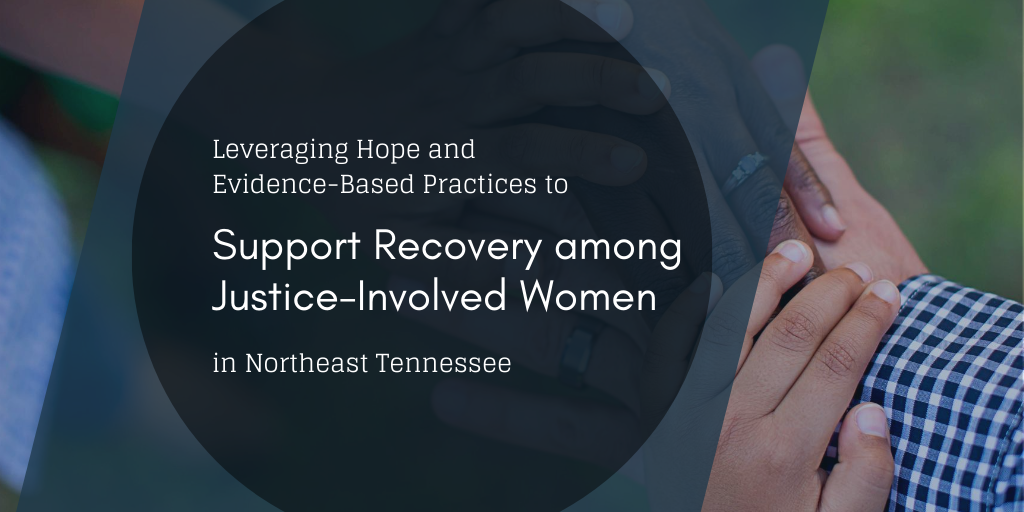It takes “feet on the ground” and a lot of hard work to help women and families affected by incarceration, trauma, and mental and substance use disorders, says Lisa Tipton, LADAC, co-founder and executive director of Families Free in northeast Tennessee. However, she believes individuals, families, and whole communities can be restored to health and wellness.
Tipton was working with children whose incarcerated mothers had mental and substance use disorders when she saw a tremendous need not only to restore families but also the criminal justice system itself. “We saw women who did not have the resources for good legal representation, all the way to being released to a supervision system where they had no chance of success,” Tipton says. Frequently, the women had no driver’s license or car to get to their probation appointments or a job, “not to mention the lack of evidence-based treatment for alcohol and substance use and the supportive services that go along with that,” Tipton adds. These women needed help not to rebuild their lives, but to be compliant with the judicial system and stay out of jail.
“We go into country jails and a women’s prison and do what we call ‘freedom recovery class,’” says Robin Ledford, LMSW, LADAC II, clinical director at Families Free. Freedom recovery class is a psychoeducational class that examines everything women need for successful reintegration in their communities, including parenting, anger management, substance use, support groups, and home plans. Families Free also provides case management to incarcerated women to help them prepare for life in the community. This might be something as simple but important as helping them obtain their vital records. They provide women with a list of resources in their local area, including treatment providers, and make sure the women get to their appointments, even if they must drive them.
In addition, Families Free facilitates Moral Reconation Therapy ® or MRT, an evidence-based cognitive-behavioral counseling program for substance use treatment in the criminal justice population. It helps the women take responsibility for some of their choices, Ledford notes. “On the one hand, you’ve got the wounds and the trauma of the adverse childhood experiences they went through that need to be healed,” she points out. “But on the other hand, you’ve got the self-responsibility, which leads to empowerment. So MRT helps focus on that side of it.”
All told, Families Free works with about 120 incarcerated women in northeast Tennessee. “We tell them that this is not treatment,” Tipton explains. “But whether you come back to our area or go to another area, we provide them with examples of what good treatment should look like, and you need to seek that out. We get them a list of resources, including 12-step groups and applications to halfway houses.”
Much of the funding for Families Free comes from the State of Tennessee, though the group did get a leg up early in its formation with the help of a federal Second Chance Act grant. When that funding ran out, Families Free leveraged state and private money to continue working with incarcerated women and families.
Both Tipton and Ledford believe in second chances. They see the havoc wreaked by intergenerational trauma in the lives of the women they serve, but they also know success stories. One woman involved in the recovery court was living in an outbuilding with an electrical cord that ran to it when they first met her, Tipton reveals. During the time Families Free has been working with her, she became pregnant, lost the baby, had a mental breakdown, and had two or three relapses. “But she has kept on responding to the help that we’ve given her and is now in her own apartment,” Tipton says. Still, it’s a daily struggle for her to maintain her minimum-wage job and not become involved with men who want to exploit her. And that’s what keeps Tipton and Ledford coming to work every day.
“We have a passion for the work,” Ledford says. Tipton adds, “We believe that the clients we encounter and the people we serve matter, their children matter, their stories matter, and this is how you restore lives and families and communities.” Accountability is important, Tipton says. “There has to be a standard of law, and that law has to be enforced,” she notes. “But there also needs to be a way back for people who find themselves on the wrong side of the law.”
Families Free staff range from peer recovery specialists to master’s-level clinicians. Among their services, they provide substance use treatment and family support to women involved in a misdemeanor recovery (drug) court. They also have the contract to provide administrative support and a full range of services to both men and women in a felony recovery court. This year, the agency will begin offering a class for pregnant women in jail, working in close collaboration with a high-risk obstetrician-gynecologist group and a local pediatric practice. “We have become a one-stop-shop for the first judicial district felony recovery court,” Tipton says. “It’s a very underserved area, very high drug abuse and poverty. We really want to bring a sense of hope of healing and restoration to a very underserved area.” The concept of restorative justice—built on a sense of faith, fairness, and right and wrong—remains at the heart of what they do.
Like what you’ve read? Sign up to receive the monthly GAINS eNews!


